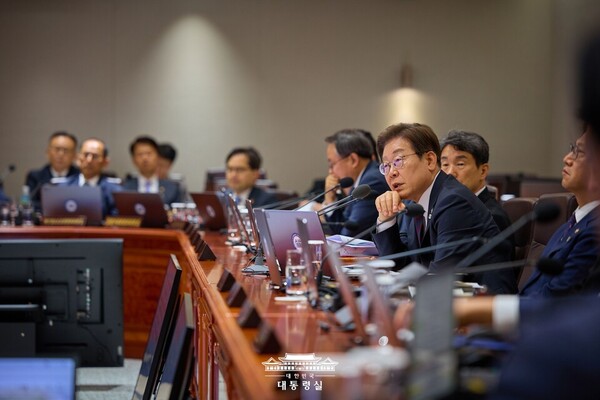With a new prime minister in place, the Lee Jae Myung administration appears to be moving in earnest to resolve the government-doctor conflict.
Upon his appointment, Prime Minister Kim Min-seok initiated a dialogue with the medical community, and the Presidential Office has hinted that it may consider adjusting the academic calendar to allow medical students to return to school.
The government's moves to resolve the conflict began with a luncheon between President Lee and Prime Minister Kim on Monday. At the luncheon, Lee asked Kim to "take up an active role in resolving the issue of returning medical students and trainee doctors.”

Kim responded immediately. Later in the day, he held an informal meeting with Kim Taek-woo, president of the Korean Medical Association, Han Sung-jon, head of the emergency committee of the Korean Intern Resident Association, and Lee Sun-woo, head of the emergency committee of the Korean Medical Student Association to hear their views on pending medical issues.
This is the first time that the new government’s top official has met face-to-face with the leaders of the medical community. The meeting was held behind closed doors, so it is unclear what topics were covered. However, it is likely to have included the return of medical students and trainee doctors, thereby improving the training environment for junior doctors and minimizing the disadvantages faced by medical students upon their return.
The dialogue between the government and the medical community will continue through Tuesday. Second Vice Minister of Health and Welfare Lee Hyung-hoon will meet with the medical community. However, the meeting will be a get-acquainted event, as it will also include the heads of the Korean Hospital Association and the Korean Nursing Association, in addition to the Korean Medical Association.
However, given that the medical association, hospital association, and nursing association are all directly or indirectly affected by the government-doctor conflict, it is expected that the issue of resolving the conflict, including the return of medical students and trainee doctors, will be the main topic of discussion.
In addition to the dialogue between the government and the medical community, concrete measures for the return of medical students will likely be prepared.
In May, the Ministry of Education warned universities that it would launch an academic inspection if they did not fail medical students as scheduled. On June 23, the ministry stressed that “there will be no academic flexibility (to normalize medical education).”
“Although the President said that the government should create a situation for medical students to return to the second semester, we are not preparing anything that can be confirmed to the outside,” a ministry official told Korea Biomedical Review over the phone on Monday. “There is no change in the principle of operating the academic year according to the academic rules, as we have already disclosed.”
The Ministry of Education's stance is that it cannot reverse the decision due to equity considerations with other colleges and universities, and given the disciplinary measures that have already been taken.
However, in contrast to the ministry's stance, the Office of the President is reportedly considering a flexible plan to reinstate the medical students.
According to Channel A, a cable TV channel, an official from the presidential office stated that medical school flexibility should be viewed as a normalization, not a privilege, and that the future needs of the medical community will be discussed from the ground up, with flexibility being one of them.
As the Lee administration, which began conducting state affairs in earnest with the appointment of the prime minister, is taking swift and proactive steps to resolve the medical conflict, attention is turning to whether it will be able to resolve the conflict that has been ongoing for more than a year after the Yoon Suk Yeol government increased the number of medical school students by 2,000 in February last year.
Related articles
- Only 7% recruited: Korea's emergency medicine faces severe shortage
- President Lee urges action to bring med students back this fall
- ‘Hospitalists are key players in specialist-oriented hospital systems’
- ER doctors urge government apology for failed policy, not blame on trainees
- Lawmakers slam health ministry for cutting budget for trainee doctors
- Cracks emerge in trainee doctors’ strike as hospital chapters urge negotiated return
- Doctors urge Lee administration to resolve medical crisis, restore training programs
- Despite a thaw in conflict, essential departments worry about lack of trainee doctors
- Leader of medical students' group defends students' return
- Trainee doctors signal return but warn of bleack future without legal, training reforms
- President Lee instructs education ministry to follow up on medical students’ return to school
- 'Lee government’s health policy lacks focus on patients, present challenges'
- Lee government's public healthcare policy is no different from its predecessor’s: civic groups

